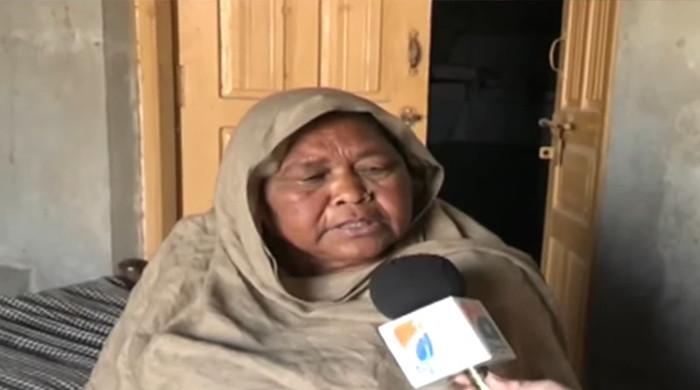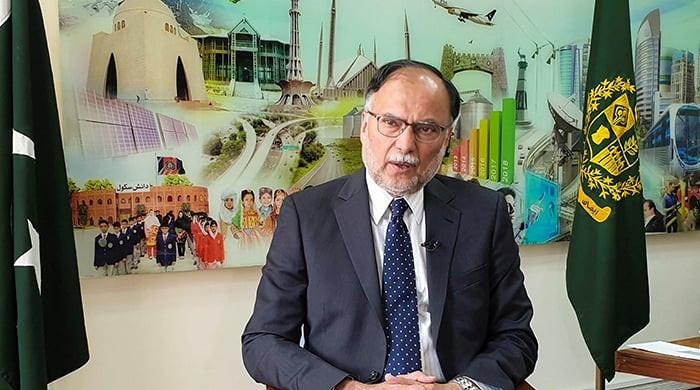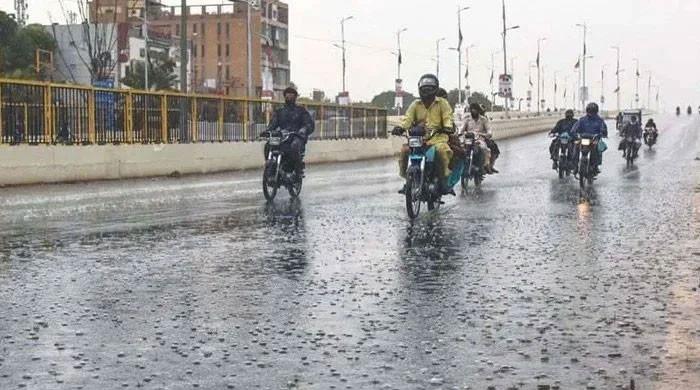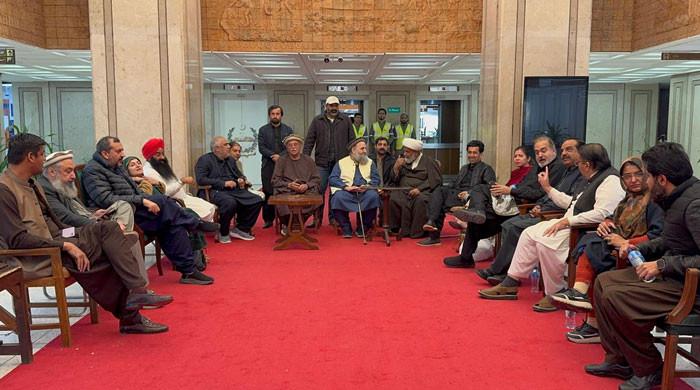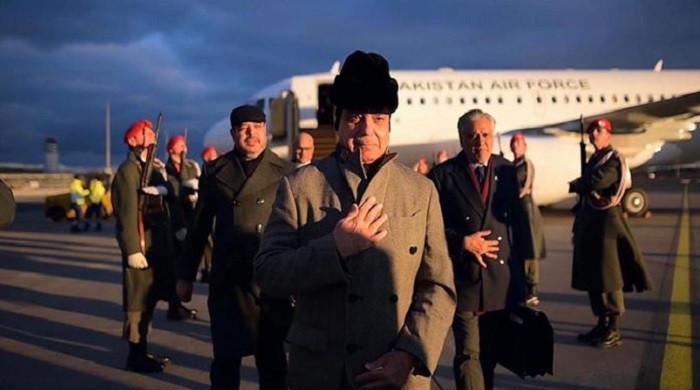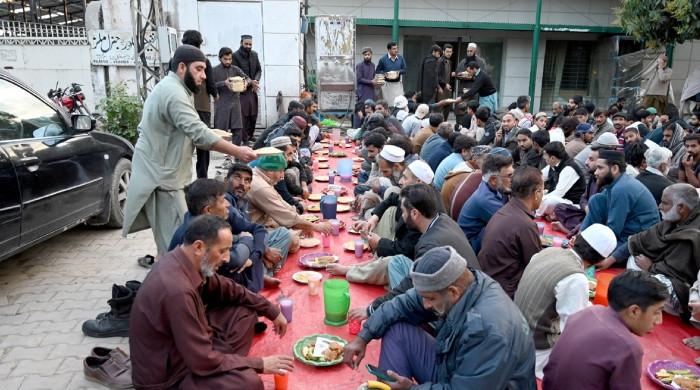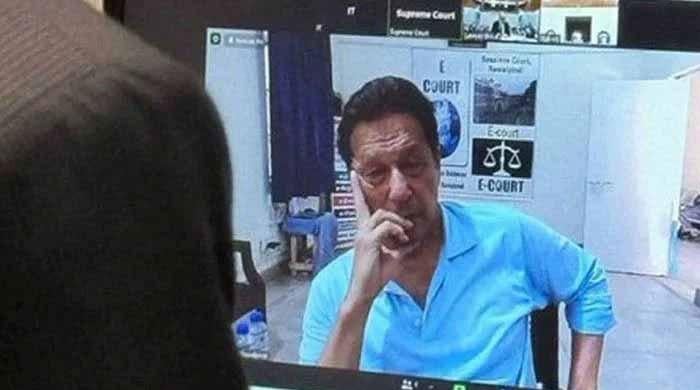'Historic day': Mustafa Kamal, Farooq Sattar back to MQM fold
"Will not let local body polls take place on January 15," MQM-P Convener Khalid Maqbool Siddiqui says
January 12, 2023
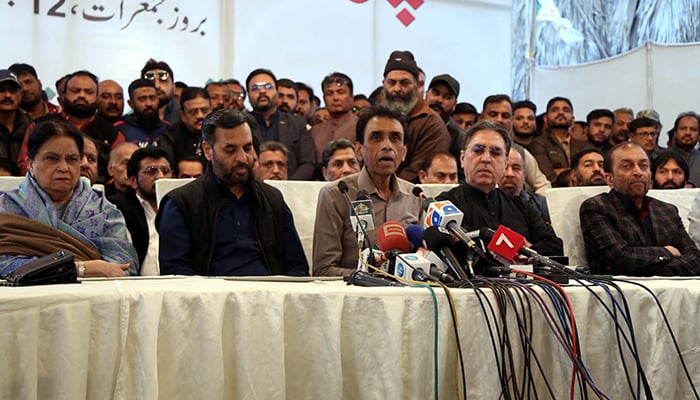
- MQM-P warns against staging of local body polls.
- "Fix" delimitation first, MQM-P tells govt.
- Analyst sees merger's impact on general polls.
KARACHI: In a much-hyped merger, Mustafa Kamal and Dr Farooq Sattar — who had formed their separate factions — Thursday joined the Mutahida Qaumi Movement-Pakistan (MQM-P).
Kamal had established the Pak Sarzameen Party in 2016 and Sattar formed the MQM-P Bahali Committee in 2018 after developing differences with the party.
Political commentators termed the move "major", but noted that despite it not having an impact on the local body polls, the merger of the old guard will definitely affect the 2023 General Elections if the party remains intact.
In a press conference flanked by the top brass of the party, MQM-P Convener Khalid Maqbool Siddiqui said the "graveness" of the situation in Sindh's urban areas requires all people to join hands.
"It is important that under the circumstances, the people, whose families laid down their lives for Pakistan's formations, should come together for a historic struggle," the MQM-P leader said.
Siddiqui said that the elements who wished to divide the nation are disappointed and vowed that the rejuvenated MQM-P would live up to the dreams of the masses and strive for urban cities' development.
"I welcome you all — Kamal, Sattar, and their aides. I hope that all of you will strive for the nation," the former federal minister for information and technology added.
In response to a question from a journalist, the MQM-P convener said that the party would not allow the staging of the upcoming local body polls — a move that will invite criticism from opposing parties.
"If they redo the delimitation again, we are ready to participate in the local body polls. If it is not fixed, then we will fight for our rights," Siddiqui warned.
'Unthinkable'
For his part, Kamal said this day will be remembered in history as an “important day” as certain decisions would be taken today that are “unthinkable”.
“If we [the MQM-P leaders] talk about ourselves, then we have taken such unthinkable decisions in the past as well, which were beyond people’s comprehension,” he said, recalling that when he left MQM founder Altaf Hussain on August 14, 2013, he was a senator and the member of the Rabta committee.
He clarified that he had no personal differences with Hussain and that the decision to leave the party was completely based on political differences.
Walking the journalists down the events that took place in the past, Kamal recalled that in October 2013, then-member of the Rabta committee Anees Qaimkhani left Hussain’s party, and for three years both leaders remained silent.
“On March 3, 2016, we [Kamal and Qaimkhani] came to Karachi and bluntly spoke the truth, which was once again in the wider interest of the Muhajir cause,” he said.
Kamal said the decision taken on March 3 — the date when he formed his party — was for the people and nation.
'RAW' label
Lambasting the Pakistan Peoples’ Party (PPP), the former senator said: “We did not remove the label of Indian intelligence agency Research and Analysis Wing (RAW) from Karachi so that [PPP Co-Chairman Asif Ali] Zardari can consider the metropolitan as his fiefdom."
He further added that the former president wants to make his son, Foreign Minister Bilawal Bhutto-Zardari, the next prime minister, while the people of Karachi and Hyderabad continue to suffer due to a lack of employment opportunities and basic facilities like the absence of clean drinking water, electricity, etc.
“The PPP has constantly failed to deliver its promises while the PTI was also unable to perform in the city of lights,” he said, asserting that if Zardari wants to make Bilawal the prime minister, he should address the grievances of the people of Karachi.
He maintained that when the factions had differences among themselves, they were shown publically, and now that everybody has decided to join hands this is also in the wider interest of Karachi.
“If Muhajirs continue to suffer in Karachi then the same will be the fate of other communities,” Kamal warned, adding that they have built Karachi before and will continue to do this under the leadership of Siddiqui.
Taking over the presser, Sattar said the leaders have kept their differences aside to establish a "unified and organised" MQM-P, which will work for the Muhajir cause.
Lamenting about the ongoing situation in Pakistan, the MQM-P Bahali Committee head said: "All political parties in the country are at each other's throats."
"If MQM-P is given the opportunity, we can generate $10 billion through our own resources," Sattar said as he slammed the coalition government for the Geneva climate moot, where the country secured pledges of over $10 billion.
Sattar, when talking about the local government elections, echoed Siddiqui and said that the party would not allow the staging of polls and if they do take place, it would protest on the city's main artery, Sharea Faisal.
'No impact on local polls'
Political analyst Mazhar Abbas, while speaking on the merger of the three factions of the MQM said that the move “is a major development”, attempts for which had been going on since 2016.
However, he said: “There were a lot of problems, including massive distrust of the involvement of the London group which led to the delay of the merger”.
“The formation of Pak Sarzameen Party in 2016”, the analyst said, “and then Farooq Sattar’s exit from the MQM were also major developments, but it is unlikely that this merger will impact the upcoming LG polls on January 15.”
However, if the merged factions stay strong and united till the 2023 General Elections it is possible that the MQM may see a revival in Karachi and Hyderabad.
Abbas believes that it is of critical importance to see how the MQM-London faction reacts to this merger.
The London faction has categorically rejected the off-shoot parties and factions, he added. “In fact, the faction that had been referred to as ‘Haqparast’ in the past is standing in these elections as ‘wafaparast’.
“What is left to see is how the leaders of the merged parties will behave and if they can truly stand in solidarity with each other. People’s reception to the merger is also of importance.”
Abbas concluded that on the whole the merger of the parties is a positive move and the coming together of otherwise dissident groups is always a positive sign in politics.
In response to the development, political commentator Zia-ur-Rehman said that while the development of the merger of the two MQM factions is an important one, it will have no bearing on the local government polls scheduled for January 15.
“However, the merger is likely to impact the general elections of 2023,” he noted.
Citing the proximity of the election to the merger, Zia summarised that since both factions had prepared for the elections independently and Pakistan Tehreek-e-Insaf (PTI), Jamaat-e-Islami (JI), and Pakistan Peoples Party (PPP) had been campaigning for some time now, it was unlikely that the merger would impact the upcoming elections.
To be or not to be with PDM
A day earlier, leaders of the Karachi-based party asked Prime Minister Shehbaz Sharif to tell them whether or not he was responsible for the situation of the port city and Hyderabad so that the party could accordingly decide about staying with or leaving the federal government.
The party convener had said that the pre-poll rigging had been done in the urban areas of Sindh. The state could not conduct a proper census, he said, adding that the urban areas of Sindh earned 97% of the province’s revenue but others stole it.
He claimed that the Pakistan Peoples Party had made union committees (UC) inclusive of 30,000 voters in areas dominated by its supporters while the number of voters in a UC in Mohajir-dominated areas was more than 90,000. “This is clear violation of the law.”




